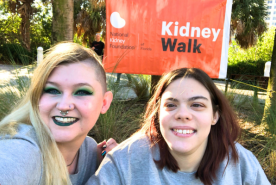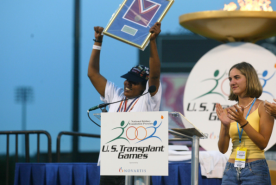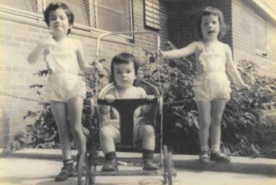Last Updated: April 11, 2024
Medically reviewed by NKF Patient Education Team
About Life After Transplant
Having a kidney transplant is a life-changing event. Knowing what to expect is important for your peace of mind and gives you the best chance at living a full and healthy life with your new kidney.
Remember, having a kidney transplant does not “cure” kidney disease. The long-term success of a kidney transplant depends on many things. After transplant, you have three main jobs to take care of your new kidney:
- Take all of your anti-rejection and other medications in the correct amount, at the right time, every day, to keep your body from rejecting your new kidney.
- Keep in touch with your transplant team. Go to appointments and get your lab blood draws done on schedule to make sure your kidney is working the way it should. And if you have a question or concern, ask – when in doubt, reach out.
- Follow a healthy lifestyle, including a healthy diet, exercise, keeping a healthy weight, and quit smoking, if needed. Following a healthy lifestyle can lessen the chances of more problems, including heart disease, high blood pressure, and high cholesterol.
People with kidney failure who receive a transplant have a longer life expectancy than people who stay on dialysis, meaning they live longer on average. Taking good care of yourself and your new kidney gives you the best chance at living a longer, healthier life.
Rejection
Rejection is one of the biggest risks after getting a transplant. Since you were not born with your transplanted kidney, your body will think the new kidney is “foreign” or isn’t yours, and will try to protect you by “attacking” it. You must take your anti-rejection medicine exactly as your doctor prescribes to prevent rejection.
There are two common types of rejection:
- Acute Rejection – Can happen any time after transplant, usually during the first year, and can usually be treated successfully.
- Chronic Rejection – Usually happens slowly over a long period of time. Treatment is often not successful.
Chronic rejection is the most common reason that kidney transplants fail. It is important to remember that taking your medications is the best way to protect your kidney. Sometimes, even if you take your medications, rejection can still happen. The sooner you let your transplant team know about a problem, the more they can help you keep your kidney.
Signs of rejection to tell your transplant team about:
- Flu-like symptoms
- Fever of 101° or greater
- Decreased urine output (peeing less or less often)
- Gaining weight unexpectedly
- Pain or tenderness over your new kidney
- Fatigue (feeling sleepy)
Sometimes, there aren’t symptoms of rejection, which is why it’s important to get your bloodwork done and go to your follow-up appointments.
Medications
Anti–rejection medications, or immunosuppressants, lower your immune system and keep your body from attacking your new kidney. You will need these medications for as long as you have your kidney transplant.
Every patient will have different medications in different amounts. Most people will take 2-3 anti-rejection medications by mouth, once or twice per day. The cost of medication will be different depending on your insurance.
Anti-rejection medications have some side effects, which are usually manageable for most patients. Some side effects also decrease after time. Blood levels of anti-rejection medications will be checked regularly to prevent rejection and lessen side effects. If you have any side effects, talk to your doctor about changing the dose or type of medications.
You should never stop taking your anti-rejection medication no matter how good you feel and even if you think your transplanted kidney is working well. Stopping or missing them can cause rejection and may lead to having to go on dialysis or getting another transplant.
Keeping Up with Your Regular Health
After transplant, you have the chance to return to some of the “normal living” you had before, including “normal” doctors and appointments. Besides keeping you healthy, your anti-rejection medicines can put you at higher risk for things like eye problems, skin cancer, and problems with your mouth or teeth.
Keeping up with your doctors' appointments is very important, especially after getting a transplant. It’s important to have regular visits at least once a year with your:
- Primary care doctor (regular doctor you see in your community)
- Nephrologist (kidney doctor)
- Dermatologist (skin doctor)
- Dentist
- Optometrist (eye doctor)
There are a few other things you can do to stay healthy and lower your chances of having some of these problems.
- Practice sun safety: wear a hat and sunscreen
- Don’t smoke
- Practice safe sex
- Get your cancer screenings on time
Food and Nutrition
Most people with a kidney transplant don’t have many limits on what they can eat or drink, but it's important for everyone to follow a healthy diet (low fat, low salt) and drink plenty of fluids. If you have diabetes or other health problems, you may still have some limits on what you can eat or drink. A dietitian can help you plan meals that are right for you.
Additionally, you may need to avoid eating certain types of foods. Your healthcare team can help you understand which foods you should stay away from – and why. These include:
- Raw or undercooked meat, fish, and seafood.
- Raw or undercooked eggs
- Unpasteurized milk, cheese, and yogurt
- Grapefruit and unwashed fruits and vegetables.
For more information on safe food handling go to USDA: Basics for Handling Food Safely
Gaining weight after transplant is common. Some of the medications can make you hungry, and you’ll be able to eat different foods than when you were on dialysis. Gaining too much weight can increase your risk of heart problems, high blood pressure, and new-onset diabetes after transplant. If you need help, talk to the dietitian on your transplant team. The dietitian can help you with a plan to keep a healthy weight and provide Medical Nutrition Therapy, covered by Medicare, if you need it.
Emotional Health
Having kidney failure, being on dialysis or getting a transplant can be an emotional experience. Feeling anxious and depressed, as well as feeling guilty when you get a transplant, is common for a lot of people. You may be overwhelmed by new changes in your life, changes to your sleep, other health problems, or stress from the transplant itself. For example, it is normal to worry about the health of your living donor or think about how someone had to pass away for you to get a kidney.
Let your transplant social worker know if you are having a hard time, or talk to another person who has had a transplant. Sometimes, anti-rejection medications can cause depression or mood swings, so letting your transplant team know will help them figure out if changing your dose or changing treatment options may help. Remember, almost all transplant patients will have some of these feelings, right after transplant, or sometimes years later.
Travel
One of the many great things that happens after getting a transplant is having more freedom to go on vacations or traveling to see family and friends. Your transplant team will most likely suggest that you wait a certain period of time (usually between 6 months to a year) before traveling inside and outside of the country to make sure your kidney is working well. You should ask your transplant team for their recommendations.
Pregnancy and Fertility
For both men and women, the chances of having children improve after a successful transplant (if the problem was due to having kidney disease or being on dialysis). Women who would like to become pregnant should wait at least a year after transplant and speak to the transplant team about medications, since some can hurt the baby during pregnancy.
To learn more about pregnancy and fertility after transplant, visit Pregnancy and Transplant.
Infections and Vaccines
The anti-rejection medicines that help keep your body from rejecting your transplanted kidney also lower (or weaken) your immune system. Because your immune system is lowered, you are more likely to get viral infections and other illnesses.
Finding and treating infections as early as possible is the best way to keep you and your transplanted kidney healthy. Being around other people with diseases such as the flu, pneumonia, or COVID-19 can make you very sick. Getting the vaccines that your transplant team recommends can help you stay healthy. It is also important to:
- wash your hands often or use an antimicrobial gel (hand sanitizer) during cold and flu season
- wear a mask if you are in crowded places or near sick people
- stay away from people who are sick and from children who have had a live vaccine recently
Vaccines help your body protect you from infection. Many vaccines are safe and helpful after transplant, but you should not get “live vaccines” which can make you sick if you have a transplant. Some examples of live vaccines include Measles, mumps, rubella (MMR combined vaccine); Rotavirus; Smallpox; Chickenpox; Yellow fever; and intranasal (nose spray) flu vaccines. Check with your transplant team before getting any vaccines or boosters.
Questions to ask your healthcare team:
Before Transplant
- What risks or complications should I watch out for in the long-term with my health and my family history?
- How will you stay in touch with my other doctors after transplant? What will that be like in the long term?
- What are helpful tips to help me stay organized with my medications?
- What kind of healthy meals or foods can I make?
- What are some exercises that I can do to stay active?
- How long should I wait before traveling?
After Transplant
- What are my medication levels? Are they at the right level for me?
- How often should I be getting labs? Can I get my labs at a place that is close to where I live?
- Is my kidney showing any signs of chronic rejection? Is that something you are checking?
- What are my options for a safe and healthy pregnancy?


















